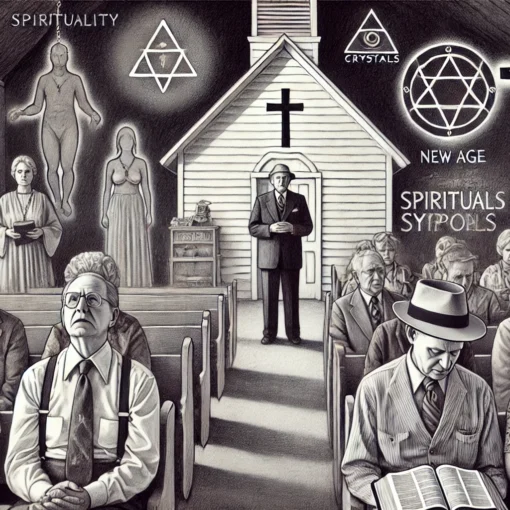Explore the inspiring life of St. John Vianney, his triumph over demonic attacks, and his unwavering dedication to saving souls through faith and humility.
When you think of saints, you might picture serene figures gazing heavenward, halos glowing softly around their heads. But St. John Vianney, the humble Curé of Ars, wasn’t your typical saint. His story isn’t just one of quiet prayer and sacrificial love—though there was plenty of that—it’s also the tale of a fierce spiritual warrior who faced the devil himself.
This 19th-century French priest battled more than sin and despair in his little parish; he took on darkness head-on, with nothing but faith, grit, and an unshakable devotion to God.
A Humble Beginning
Born on May 8, 1786, in Dardilly, France, Vianney grew up in the turbulent shadow of the French Revolution. It was a time when priests risked their lives to serve the faithful, and young John saw their courage firsthand. But his path to the priesthood wasn’t smooth—far from it. Academically, he struggled mightily. Latin, a required subject, was his personal tormentor, nearly derailing his dream of becoming a priest. Yet his sheer determination and deep piety carried him through.
In 1815, he was finally ordained. Shortly afterward, he was sent to Ars, a tiny, spiritually desolate village. No one could have predicted what would happen next.
Transforming Ars
When Vianney arrived, Ars was far from a beacon of faith. Few people attended church, and many were more interested in taverns than sacraments. But Vianney didn’t let that discourage him. He began with small acts of love and faith: visiting homes, caring for the poor, and preaching with a sincerity that pierced hearts.
Slowly but surely, things changed. People started coming to church. They began seeking confession, drawn by the simplicity and power of his words. His sermons weren’t flowery or grand—they were honest and convicting. And when he spoke of God’s love and mercy, people listened.
The Devil’s Wrath
This wasn’t a victory the devil took lying down.
St. John Vianney believed that his relentless efforts to save souls made him a prime target for demonic attacks. He referred to the devil as “le grappin” (the grappler), a nickname that hinted at the hand-to-hand nature of their spiritual battles.
Imagine this: night after night, Vianney lay in his simple bed, exhausted from hours of hearing confessions. Suddenly, the quiet would shatter. Bang! The walls would shake, furniture would rattle, and strange, guttural noises would fill his room. Sometimes, he’d hear mocking laughter. Once, his bed even burst into flames. Yes, actual flames. But Vianney didn’t flinch. He doused the fire and carried on, remarking dryly that the devil was just upset because he’d stolen another soul from him that day.
“I’m not afraid of the grappin,” he said once. “The worst he can do is make a lot of noise.”
Why the Devil Hated Him
The devil’s fury wasn’t without reason. Vianney had become a spiritual giant, especially in the confessional. People traveled from across France—and eventually, from other countries—to confess their sins to the humble Curé of Ars. It wasn’t uncommon for him to spend 16 hours a day hearing confessions, offering not just absolution but hope. Souls weighed down by despair found freedom in his words. He was, quite literally, stealing people from the jaws of hell.
For a demon, that kind of success is unacceptable.
A Saint’s Response to Darkness
What’s remarkable about Vianney is how he responded to these attacks. No drama, no theatrics. He met the devil’s antics with prayer, humility, and a good dose of humor.
When the noises kept him awake, he’d shrug it off and offer his sleepless night to God. If something frightening happened—like seeing grotesque, shadowy figures in his room—he’d grab his rosary and pray. And when the devil mocked him, he mocked right back, calling him “a barking dog” that couldn’t bite.
A Legacy of Hope
By the time St. John Vianney died in 1859, Ars had become a spiritual haven. His simple, unyielding faith had transformed the village, and his example continues to inspire priests and laypeople alike. He was canonized in 1925, and in 1929, Pope Pius XI declared him the patron saint of parish priests.
Today, his life reminds us that holiness doesn’t mean living without struggle. In fact, it often means facing challenges—sometimes terrifying ones—with courage and trust in God. Vianney’s battles with the devil aren’t just an interesting footnote in his story; they’re a testament to the power of faith to overcome even the darkest forces.
Lessons for Us
St. John Vianney’s story is full of lessons. Here are just a few:
- Spiritual Warfare is Real: Vianney’s encounters with the devil remind us that evil is not just an abstract concept. It’s real, and it’s opposed to God’s work in the world. But it’s also limited—no match for God’s power.
- Humility is a Weapon: Vianney didn’t think of himself as a great man. He considered himself weak and unworthy. But his humility was his strength, allowing God to work through him in extraordinary ways.
- Perseverance Pays Off: He faced rejection, hardship, and even demonic harassment, but he never gave up. His life is proof that persistence in faith can yield incredible fruit.
- Humor and Joy Defeat Fear: Even in the face of supernatural attacks, Vianney kept his sense of humor. His calm, joyful demeanor disarmed the devil’s threats and showed that fear has no place in a heart filled with trust in God.
St. John Vianney may have been a simple parish priest, but his story is anything but ordinary. It’s a vivid reminder that the battle between good and evil is ongoing—and that, with faith, even the humblest among us can become warriors for Christ. So the next time you hear a bump in the night, maybe remember Vianney. And don’t forget to pray. After all, you never know what might be rattling around out there.





